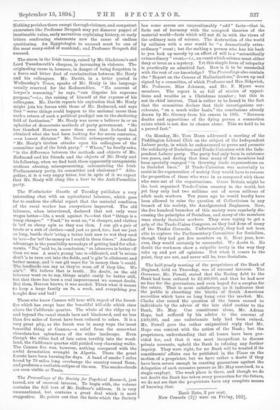The storm in the Irish teacup, raised by Mr. Gladstone's
and Lord Tweedmouth's cheques, is increasing in violence. The originating canoe is, however, in danger of being forgotten in a fierce and bitter duel of recrimination between Mr. Healy and his colleagues. Mr. Devitt, in a letter quoted in Wednesday's Times, speaks of Mr. Healy in the language usually reserved for the Redmondites. "No amount of lawyer's reasoning," he says, "can disguise his supreme purpose,"—i.e., the raising of himself at the expense of his colleagues. Mr. Davitt repeats his aspiration that Mr. Healy might join his forces with those of Mr. Redmond, and says that "worse things could happen to the national cause than such a return of such a political prodigal son to the sheltering fold of factionism." Mr. Healy was never a believer in or an upholder of democratic methods of party government. "He has thanked Heaven more than once that Ireland had obtained what she had been looking for for seven centuries, —an honest dictator." Mr. Devitt subsequently speaks of " Mr. Healy's tireless attacks upon his colleagues of the committee and of the Irish party." " Where," he finally asks, 4' is the difference between the methods and objects of Mr. Redmond and his friends and the objects of Mr. Healy and his following, when we find both these apparently antagonistic sections abusing, misrepresenting, calumniating the Irish Parliamentary party, its committee and chairman P" Alto- gether, it is a very angry letter, but in spite of it we expect that Mr. Healy will cling like a burr to the Anti-Parnellite party.


































 Previous page
Previous page